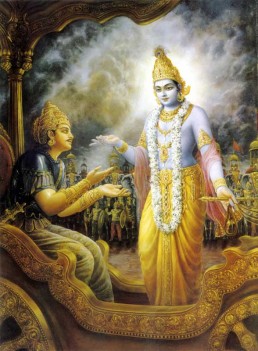
राजविद्याराजगुह्ययोग
Rājavidyā-rājaguhya-yoga - The Royal Secret
The previous chapter was a brief digression into techniques of saguna-upasana which is not the main theme of the Gita. Here the Lord continues the teaching as it was given in the 7th chapter and reiterates and expounds on those matters. He again points out that those who seek mere materialistic results can gain those by His grace but anyone who desires Him alone will merge with Him, regardless of their worldly conditionings based on gender, birth etc. Below are the main themes of Chapter 9:
Verses 1 - 3
Introduction to the knowledge, its glory and necessary qualifica-tions
Verses 4 - 10
Nature of God
Verses 11
Cause of bondage
Verses 12 - 19
Atheists, theists and types of upāsanā
Verses 20 - 29
Sakāma-bhaktas and niṣkāma-bhaktas
Verses 30 - 34
Glory of bhakti
Gita Chapter 9 - 34 Verses
Chapter 9 - 34 Verses
Confidential Knowledge of The Ultimate Truth
Background
[In the eighth chapter, saguṇa-upāsanā was pointed out as a means to attain krama-mukti. In fact, it was an incidental topic. The aim of the Lord is not to teach saguṇa-upāsanā as a means for krama-mukti. The main purpose of upāsanā is to qualify oneself to know the true nature of the Lord and attain liberation in this life itself (jīvanmukti). Thus, the Lord wants to teach upāsanā mainly as a preparatory step to knowledge. This was done in the seventh chapter. Kṛṣṇa brings out this idea in this chapter also.]
In the first three verses, Kṛṣṇa introduces the topic, its glory, and the qualifications needed for its pursuit. The topic is the knowledge of god in both the saguṇa and the nirguṇa forms (jñāna and vijñāna). It is the most secret and sacred knowledge which releases one from bondage. It is the easiest and immediate in giving the result. The seeker should have faith in the teacher and the teaching if the pursuit should be fruitful.
In the next three verses (4 to 6), the Lord reveals His true nature. He pervades the entire universe. Still, He is not related to anything. In fact, there is no universe other than God. Yet, it appears because of His māyā. He is ever non-dual and relationless like space (kevala and asaṅga).
Then Kṛṣṇa comes down and redefines Himself accepting the universe (7 to 10). He is the basis for the origin, existence, and dis-solution of the entire universe (jagat-kāraṇam). Blessed by God, His prakṛti which is inseparable from Him, keeps the cycle of creation go-ing. Though the Lord’s presence is inevitable for all these phenomena, He is not involved in any one of them as doer or enjoyer. He is akartā and abhoktā.
In the 11th verse, Kṛṣṇa talks about the cause of bondage. Be-cause of the fundamental ignorance, no one knows the nature of God. Consequently, He is mistaken for human being with birth, form, etc. (Thus it is due to ignorance and consequent delusion regarding the na-ture of God — and oneself — that one gets bound).
Though ignorance is universal, many do not accept the fact. Hence, they never attempt to get rid of it. Believing neither in the scriptures nor in the established traditions, these atheists take to evil ways as directed by their instincts and waste their precious life (12).
On the other hand, there are some noble people who clearly rec-ognize their bondage and worship the Lord, seeking Him alone to get out of the bondage (13, 14). Kṛṣṇa points out here that various devo-tees worship Him in manifold ways. Some worship God as identical with themselves, some as different from themselves, and some as ev-erything (15). In this context, the Lord describes His cosmic form i.e., viśvatomukhatvam (16 to 19).
In the next three verses, Bhagavān talks about two types of devo-tees — those who seek various finite ends through Him (sakāma-bhaktas) and those who seek the infinite God only (niṣkāma- bhakatas). The Lord points out that the worship for finite ends will be definitely fruit-ful. But, being finite they cannot last long. Even the attainment of heavens is finite only. A niṣkāma-bhakta worships God seeking noth-ing else. The Lord promises to take care of even the worldly well-being of such a bhakta because he has renounced all his worldly pursuits (22).
From verse 23rd to 29th, the Lord stresses the point that whether one should continue in saṃsāra (bondage) or attain mokṣa (liberation) is one’s own choice (puruśārtha). When people seek finite goals through the worship of other deities, they are invoking the finite aspects of that one infinite God alone (23). All their prayers go to that one God only. (The amount of water that we can fetch from the ocean depends on what vessel we take.) Thus, they miss the infinite due to ignorance (24). Though the Lord is capable of giving everything, He can give only what the devotee is willing to receive. Hence, the Lord says that one gets what one seeks (25). What type of worship one must do to attain the infinite? Bhagavān says that the worship is the simplest for a niṣkāma-bhakta. He can offer anything. The attitude is important (26). Even if that is not possible, one should convert every action into wor-ship by (mentally) offering it at the feet of the Lord (27). Such a bhakta is a karma-yogī (because he continues to act with equanimity) as well as a sannyāsī (because he renounces the concern for the results). He be-comes purified and liberated soon by getting the teaching of scriptures through a guru (28). Kṛṣṇa concludes this topic by reemphasizing that He is available to all. It is for us to claim Him or not (29).
In the last five verses Kṛṣṇa glorifies bhakti. The greatness of bhakti is that even those who are not qualified for self-knowledge be-cause of their past sins, weaknesses, extrovertedness, or dullness can take to bhakti and achieve the goal. Thus, bhakti is universal. The devotee will never perish. In conclusion, Kṛṣṇa sums up the pursuit of Bhakti thus — “Fix your mind on Me; be My devotee; keep Me as your goal; be My worshiper; surrender to Me. Thus fixing the mind, you will attain Me alone who am the Self.”
(Here, we should note that bhakti — whether it is taken as con-stant love of God or meditation on saguṇa-īśvara, cannot directly take one to the goal. It can take one to a guru only. One has to gain Self-knowledge by the study of scriptures under a guru. This alone can lead one directly to liberation.)
The main topics of this chapter are:
- Introduction to the knowledge, its glory and necessary qualifica-tions: 1 to 3
- Nature of God: 4 to 10
- Cause of bondage: 11
- Atheists, theists and types of upāsanā: 12 to 19
- Sakāma-bhaktas and niṣkāma-bhaktas: 20 to 29
- Glory of bhakti: 30 to 34
Since this chapter deals with the knowledge of God which is the greatest (rājavidyā) and the rarest (rājaguhya), it is called Rājavidyārāja-guhya-yoga.

